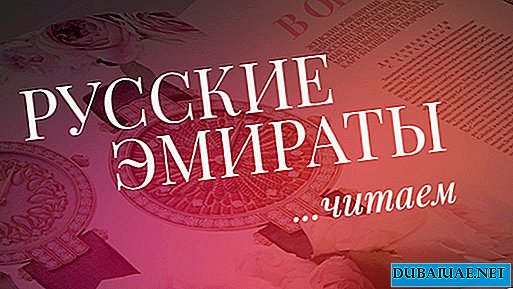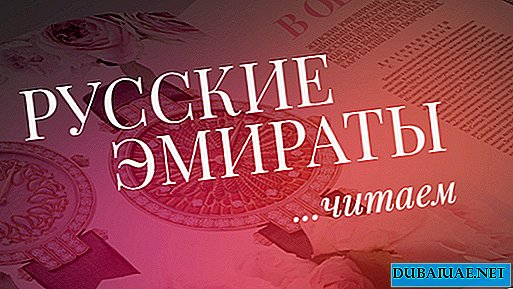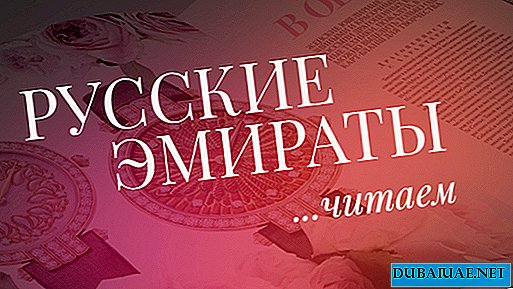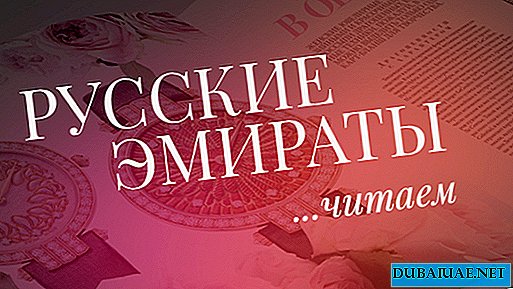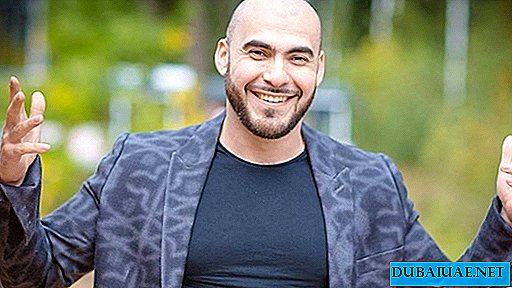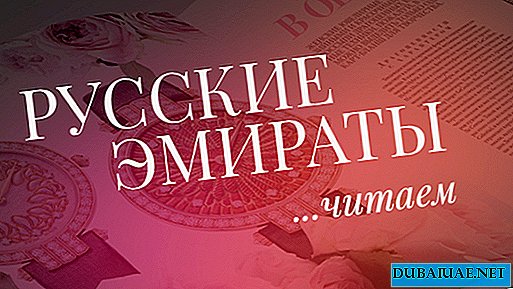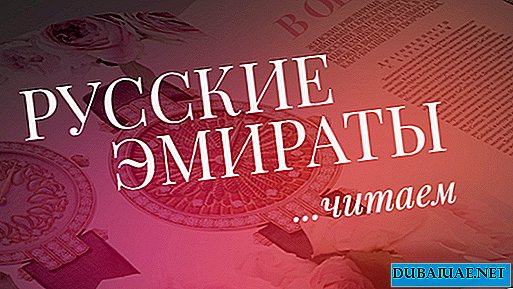 We walked with my son along the public beach in Abu Dhabi in the Ar-Ras al-Ahdar area near the "Sea Palace" of the Emirate President. They evaluated the new luxurious hotel "Emirate Palace", talked about this and that. It was a weekday. Baked. There were few people on the beach. We caught up with the dark-skinned emirate with an uncovered cropped head in a white dishdash (national men's clothing) and sandals. For some time we walked flush, not showing interest in a fellow traveler and continuing the conversation.
We walked with my son along the public beach in Abu Dhabi in the Ar-Ras al-Ahdar area near the "Sea Palace" of the Emirate President. They evaluated the new luxurious hotel "Emirate Palace", talked about this and that. It was a weekday. Baked. There were few people on the beach. We caught up with the dark-skinned emirate with an uncovered cropped head in a white dishdash (national men's clothing) and sandals. For some time we walked flush, not showing interest in a fellow traveler and continuing the conversation.
A fellow traveler listened and suddenly intervened in the conversation, asked in Russian: "How are you?" We exchanged a few words about the weather and water, Russians and Russian speakers living in the Emirates. We considered that our interlocutor serves in the police and looks after the order on the beach or has any other duties in the immediate vicinity of the "seven-star" facility, where the richest and most influential people of not only the Arabian region often stop. Local life sometimes drove me with such "plainclothes employees" who, performing special duties, remain pleasant and good-natured people, admit that they learn Russian at work in the interests of ensuring internal security.
Soon, the emirate’s Russian vocabulary, completing at first glance the fourth dozen lived years, ran out, and I continued the conversation in Arabic. He asked, of course, where did his knowledge of the Russian language come from. He replied: "I learned from wives. Wives, what you want, will be taught, especially Russians." Then it was time for me to be fully surprised. "Wives"? - "Yes. I have two Russian wives!" - "And just how much"? - "In total - three. The first wife is local." To the question: "Do they get along"? - he replied: “Al-Hamdu Lillah (Praise be to Allah). They are well arranged.”
The next day I got acquainted with my wives. The son flew to Moscow, and we arranged a small farewell picnic on the beach. Nearby on the mat was a lone bather in swimming trunks. Observing decency, we did not look closely at the neighbor. He approached himself, because he turned out to be our acquaintance of yesterday. Soon two of his Russian wives left the sea in revealing, vibrant swimsuits. Slender girlfriends younger than 30 years old cheerfully joked in Russian among themselves, and, having joined her husband, already talked in a mixture of Russian and English. They told a little about themselves. Honestly, I didn’t particularly ask, knowing that it was not customary in Arabian countries to show interest in other people's wives, and now I reproach myself for, perhaps, excessive delicacy and discretion.
The girls said they had been living in Abu Dhabi for several years. One of them came from Kazakhstan, the other from the Stavropol Territory, where she ended up after leaving Chechnya. “The two of us have more fun,” they say. The family looked friendly and contented. She did not stay on the beach for long, and the husband took the girlfriends' wives to his harem, it is more correct to say "Harim" with an emphasis on "and", as the Arabs call the female half of the house and the woman in the collective sense of the word.
There are many foreign wives in the Emirates. They abound in families that were created in the first two decades after the formation of the emirate state, which celebrates its 35th anniversary this year. At that time, according to the press, almost every second emirate brought his wife from abroad. There was such a commotion. Few people sought emirates then. The hired foreign workers in the little-known desert, hot places the country's leadership had to lure with high salaries, benefits, promises of national passports. Many foreign brides were reluctant to go to Abu Dhabi, acting up. A prominent local businessman, Mohammed al-Fahim, admits that for two long years he sought the consent of one of the Lebanese families to give his daughter for him. In his own words, this family believed that "a young woman born in Egypt and educated in Lebanon would not be able to live a primitive nomadic life in the Abu Dhabi desert."
Children from then-married women with brides from Arab and European countries have already grown up. On the streets you can see the indigenous people in deshdashas with Filipino features. Recently I happened to meet a 20-year-old blue-eyed (!) Emirate in one of the capital's car repair shops. He said that his mother is Swedish and he is considering choosing a European wife for himself. In Abu Dhabi and Dubai, according to the guy, he has many like-minded people. Local brides are still in limited demand in the country. Some suitors reject them because of their "excessive" literacy (since the level of education of the female half of society is quite high) and everyday wastefulness. Others seek to reduce wedding expenses.
According to sociologists at the University of Al Ain, emirate suitors choose foreign wives for reasons of economy. And the matter is not only in kalym paid for the bride. Kalym alone is not so great. Islamic tradition does not impose it. The prophet, according to his wife Aisha, paid a kilogram of silver for his wives. To be absolutely exact, then 1487.5 grams. In the Bedouin environment, in the old days, 4 camels were given for the best bride. In the current Emirates, kalym, including the advance payment and the general part, is determined by law. It should not exceed 50 thousand dirhams (about 13.5 thousand dollars), which is significantly lower than the level considered acceptable for the Bedouins. Symbolic or original ransoms are sometimes levied. A certain Abdullah Mansour became famous for marrying his daughter for two dirhams. Another original, Ali Safe, took a gun for his lackeys, and Safe al-Katabi took a cow.
But marriage expenses are not limited to kalym. There are other family-related expenses that are prescribed by tradition. The groom must give his future wife precious jewelry worth, according to local grooms, up to 100 thousand dirhams (over 27 thousand dollars) and pay at least three magnificent celebrations, to which hundreds of guests are invited - engagement, marriage registration and the actual wedding. Despite the non-alcoholic nature of the local festivities, they are held with a large, generous and ostentatious scale with the participation of kindred families, friends with colleagues and just casual guests, who do not close their doors.
Dressed-up girls attend women's wedding parties, which are held separately from men's, with their own interest: to relate to brides, to evaluate the high cost of dresses and gold jewelry, the quality of rented hotel rooms, the cost of treats and other details associated with festivities, so that in the future they themselves will not strike dirt face.
The financial side of the issue when choosing a local bride is of great importance. Islamic tradition does not romanticize gender relations. Everyone knows the statement of the Prophet Muhammad regarding the choice of a wife. The great Meccan, who came from a poor family, rejected marriage to a Bedouin, and entered into a first marriage with a rich merchant who survived two husbands, who was also much older than him, said: “Take your wives for four (reasons) - for wealth, for faith in beauty and origin. " The last consideration was even included in the proverb - "if you want a child, look for him uncle on the line of his wife."
Foreign wives, of course, do not bring wealth to local grooms. But the kinship acquired by marriage with foreigners raises their prestige. In addition, imported brides, as a rule, are less spoiled, are able to housekeeping and compare favorably with wasteful local young ladies. This is recognized by the heads of mixed families in conversations with sociologists and the press, expressing concern about the growing number of "old maids" in the country, who are considered to be girls who have crossed the threshold of the 25th anniversary. Marriages of local women with representatives of other religions are prohibited. Some of them marry foreign Muslims, primarily Arabs. According to the press, in the country there are up to 18 thousand families that local women created with foreigners. Some of them receive benefits from the state.
But the problem of the girls, whose wedding procession passed by the house, remains. To save the emirate from the sad share of the "old maids" and to preserve the national purity of society, the government created in 1991 the federal "Marriage Fund". His task was to promote marriage between indigenous people. Emirates entering into their first marriage with indigenous women can receive free help from the Fund in the amount of 70 thousand dirhams (about 20 thousand dollars) for creating a family. Money is provided to grooms over 18 years of age, whose monthly income does not exceed 16 thousand dirhams (more than 4350 dollars). Spending annually about $ 70 million to finance the creation of young families, the Fund for half a decade only partially coped with its task. Billions of dollars have already been spent on financing national marriages. Nevertheless, the charitable organization owed the grooms. The President of the UAE recently repaid its deficit in the amount of 682 million dirhams (more than 185 million dollars) so as not to impede an important social process.
The state has achieved some successes in creating "purebred" family cells. But they are not very large. Before the foundation of the Fund, almost half of the young families registered here were international. Now such families make up about a third of the total. In absolute numbers, if we take into account the rapid demographic growth in the UAE, the number of mixed marriages has increased. According to the Foundation, in Abu Dhabi and Dubai over the past seven years, 19 and a half thousand marriages have been registered, of which more than 5,000 are with foreigners. This means that 27 emirates out of every hundred that formed a family during this period brought overseas wives to their homes. During the same period, just over 2,000 mixed families broke up, in which either the foreigners did not take root, or the local husbands did not like. Families that have not stood the test of life make up 41% of the total number of marriages of native grooms with imported brides.
The Marriage Fund also provides some information on the emirate of Abu Dhabi. He reports that in 2004 the emirate registered 1111 marriages between the indigenous inhabitants of the country and created more than 590 mixed families. Almost every third new family registered in the emirate capital was international. In the same year, 170 local families and 210 mixed families broke up. The percentage of divorces in mixed families is more than two times higher.
Marriages of local residents with foreigners, indeed, break up more often. "Throw", mainly Asian wives. There are objective reasons for this. The marriages of elderly Emirates with girls from the Philippines, Indonesia, and Bangladesh, mainly working as servants and located on the lower steps of the social ladder, do not differ in strength. Random family unions are frustrated when Asian wives are not at the level of rather high local demands.
National families are also fragile. The situation with divorces in the country is not original. Having entered the regional leaders in the economic sphere, the UAE received a rebound in the social sphere. Among the countries of the Arabian Peninsula, they occupy first place in the number of divorces. Every year, out of every thousand marriages, more than 360 do not pass the test of love and consent. Either they love weakly, or they are mistaken in their choice or simply finely picky. By the way, in other countries of the Persian Gulf region, despite the same religiosity of society and the same power of centuries-old traditions, family ties do not differ in strength. About 300 of every thousand families in Qatar break up, more than 200 in Bahrain, and 250 and 300 in Saudi Arabia and Kuwait, respectively. Conciliation commissions are even set up in some emirates of the country in courts considering divorce cases. The commissions give advice to families and recommendations to the courts in the spirit of the principle formulated by Mayakovsky: "You should not get divorced from a button."
Dubai police keep their statistics in the matrimonial sphere. According to its protocols, from 1997 to 2001 in a city with a million people registered 1239 mixed marriages. Officials note that the first place among the fortunate foreign brides is occupied by Iranians. To some extent, this trend is a tribute to tradition. The emirate is home to many ethnic Iranians. Once they were the majority among pearl merchants. It is known from historical documents that many sheikhs of Dubai, whose first economic heyday was at the very beginning of the 19th century, brought wives from the Persian coast and even from Shiraz. The centuries-old tradition is fueled by a large Iranian colony of more than 300 thousand people.
The Iranians, chosen as spouses by local cavaliers, are followed by stateless young women. Where they come from in local "Palestinians," the police do not explain. Third place is taken by Indian citizens. This is no coincidence. The country located on the Subcontinent has created here the most numerous and motley, feeling at home on the banks of the Ganges or the Brahmaputra, a deeply rooted colony with about one and a half million people. It permeates the entire local society from the bottom, where cheap housekeepers work, to the prosperous tops involved in gold trading, financial and banking, owning large companies. Egyptians, Syrians and Pakistanis did not get prize-winning wedding places. They settled in the next three positions. The low rating of the representatives of Egypt and Syria is somewhat surprising. Firstly, because the national colonies of these countries in the UAE are quite extensive. Secondly, since official circles, welcoming the marriages of local young people with residents of neighboring Arabian countries, are quite supportive of Arabian brides from the Middle East and North Africa, with whom they are united both by language and faith.
The state of the UAE has protected itself from external influence through the family. So the Ukrainian version, when the president can be married to a former employee of the US State Department, cannot be here. The country has passed a law prohibiting the marriage of foreign women to the heads of ministries and government departments, their deputies and assistants, employees of the diplomatic corps, military personnel from a soldier to an officer, police and security officials. Along the way, it is forbidden to marry foreign women to students who are studying abroad, and to persons under the age of 35.
New restrictive measures are being prepared. Foreigners who dream of marrying a sheikh or a simple but prosperous native inhabitant of the UAE and getting a local passport should hurry up. A law is being developed under which the three-year term for granting local citizenship to visiting wives will be increased. The issue of imposing sanctions on indigenous citizens choosing foreign wives is being discussed. It is assumed that each specific issue of the marriage of a local citizen with a foreigner will be considered by a special committee. Emirates who choose foreign wives without his permission will be dismissed from public office or lose their promotion. They will not be provided with loans and material assistance, free housing and land.
All these measures testify to the seriousness of the country's leadership’s intentions to establish order in the matrimonial sphere to ensure the interests of the beautiful half of the emirate’s society and improve the demographic situation.
 In 2004, Dubai’s suitors made 284 marriages with foreigners, and more than 30% of these marriages were terminated. According to official figures, in recent years, the number of marriages of local citizens with women from Arab countries has decreased and the number of families created by Emirates with citizens of the former Soviet Union, Ethiopia, Eritrea and even China has increased. So in the near future in Dubai or Abu Dhabi it will be possible to meet Emirati schoolchildren and schoolgirls with Chinese facial features.
In 2004, Dubai’s suitors made 284 marriages with foreigners, and more than 30% of these marriages were terminated. According to official figures, in recent years, the number of marriages of local citizens with women from Arab countries has decreased and the number of families created by Emirates with citizens of the former Soviet Union, Ethiopia, Eritrea and even China has increased. So in the near future in Dubai or Abu Dhabi it will be possible to meet Emirati schoolchildren and schoolgirls with Chinese facial features.
How many Russian women live in Emirate families as wives and hostesses is not known exactly. More than 70 Russians are registered at the consulate in the Russian Embassy. Only a third of them live in the capital. But we set our record here in Soviet times. A resident of the city on the Neva River held in Abu Dhabi the highest position among the overseas hostesses of the Emirates, being the wife of the state minister of foreign affairs in the 70s. The story of her beautiful large family that survived a terrible tragedy is a special article.
Victor Lebedev


